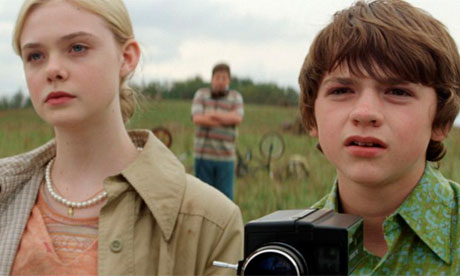 |
| Image via Huffington Post. |
Yes, “Her” is about a man who falls in love with his computer. But eventually, the fact that the love interest in question is a computer will not faze you at all. That is the magic of “Her.”

 |
| Image via Huffington Post. |
Yes, “Her” is about a man who falls in love with his computer. But eventually, the fact that the love interest in question is a computer will not faze you at all. That is the magic of “Her.”
Spoiler Review is a new series where I will review movies that require many spoilers in order to review them properly. This is my review of “Gravity.” This goes without saying: SPOILER ALERT.
Every time a movie comes out that uses 3D really well, like really really well, I never hesitate to call it the second coming of cinema. “Avatar.” “Hugo.” “Life of Pi.” Yes, I do strongly regret giving “Avatar” that much credit.
I don’t want to say “Gravity” has changed the game. It’s just responded to the tools of our time so well and it has done what many others only wished they could accomplish. More importantly, if you ever doubted that the wonder of the movies has been stolen by TV, then look at “Gravity,” and you’ll understand that it never went anywhere.
This spoiler review needed to exist. It is impossible to fully expound on “Gravity” without revealing many important twists and turns. Also, it is the kind of film enhanced by going in completely surprised. Once things start to explode, the story seems very straightforward. Yet, it also has such an uneasy and unpredictable edge to it. Maybe that’s because Cuaron decided to kill off one of Hollywood’s biggest stars halfway through and then let one person run the rest of the show. Cuaron pulled a similar move in “Children of Men.” I like when movies do this. Wait, that sounded bad. I’m not sadistic, but taking an event that would normally end a film and putting it so early on is always daring. Not only that, but it will always carry the film into another direction.

Clooney’s death also leads to one of the greatest fake outs in recent memory. Kowalski’s return elicited groans from the entire audience. However, it just didn’t sit well with me from the beginning. For one thing, he kicks out a window in outer space while she sits there with no helmet on. She covers her mouth and somehow is fine. This isn’t the season of “24″ with the nerve gas where everyone just covers their faces with a tissue and is somehow fine. “Gravity” can’t get every scientific detail right, but this one was too obvious.
I’m sure Cuaron knew what kind of reaction he’d get with that scene. Good job, it worked. And it just gave even more of a sense of how alone Stone was in space. “Gravity” is less about the fear of life on another planet and more about the fear that we are but a tiny speck in a vast, empty universe. As Frankenstein’s Monster once said: “alone…bad.”
After Kowalski dies, Stone is left to fend for herself. And oh what a beautiful performance Bullock gives. She takes what could have been a repetitive 91 minutes of screaming and floating and turns it into a one woman show. It’s a lot like James Franco’s performance in “127 Hours” as she displays so many altering personalities in such a short amount of time. The most beautiful moment in the entire film is not a shot of space, but rather the scene where Stone communicates with an unknown Chinese man. She hears his dogs bark and asks them to keep barking. Then she barks along with them. These two have so little common and don’t even speak the same language. She’s trying literally anything to keep herself motivated to survive.

Eventually, there is going to be a “Gravity” backlash, because that’s what happens with any movie this big. In fact, its already begun. People are going to compare it to other movies and identify a lack of originality. However, what I hope everyone will remember is that this is the anti-space space movie. “Gravity” is not against space, but rather it challenges our notions of what lies above. At the beginning, Kowalski plays an old western tune as he floats around. Space has always been labeled the final frontier, but what is rarely acknowledged is that it is so hard to conquer a frontier that we know so little about. Unlike many of its contemporaries, “Gravity” acknowledges the many dangers of space. Its opening title card makes note of how much the temperature fluctuates. A little bit later, Kessler Syndrome causes a chain of destruction that I am still trying to wrap my head around.
And then there is Bullock, who is constantly fighting the voices in her own head as she doesn’t have anyone else to talk to for a majority of the film. She constantly has to fight between holding on to any object that will keep her alive, and letting go of all of her earthly problems, which are inconsequential when the remains of a Russian satellite are hurtling right towards you. “Gravity” shows so much, but leaves much more to the imagination. The image of her driving through Illinois with the radio playing and no direction at all is a sad yet lovely one, enhanced by the fact that we never actually get to see it. With this, the film also plays against the idea of sci-fi films in which one tries to escape their earth forms in search of a better self. Ryan Stone was hired for the job because she’s a damn good technician, but I’m sure she also really needed an escape from her lonely life. Yet, orbiting above earth, all she finds is chaos.
Cuaron has proved himself a master of visual metaphors. That’s why I’ll let it slide every time Clooney says “I have a bad feeling about this,” because that is the worst foreshadowing possible. Instead, just marvel at the moment Ryan boards the ship and sheds her suit, her body curled up and looking very much like a baby in the womb. Most filmmakers would settle for a trite Jesus on the Cross reference, but Cuaron loves his baby imagery.
That was the first rebirth of Ryan Stone. The second comes at the end, as her module crashes on earth and against all odds, she survives. Watching her swim out of the ocean and then crawl onto land before slowly getting up was like watching an ancient creature evolve right before our eyes. It’s like the Star Baby from the end of “2001″ [Editor's Note: I STILL DON'T KNOW WHAT THAT STAR BABY IS] landed on earth. Ryan Stone might be born a new, but she is no blank slate. She has a hell of a story to tell. I picture the rest of her life will include telling people this amazing story of hers at fancy dinner parties, and then chiding them because they never got to experience it in IMAX 3D.
 |
| This is not a love story. |
“In space, no one can hear you scream.”
This is now the famous tagline from “Alien,” and the basis for “Gravity.” “Gravity” hasn’t been advertised as a horror film, but it captures the fear of being alone in space better than most others that have tried way too hard to do so.
“Gravity” marks the long awaited return of Alfonso Cuaron who last directed “Children of Men,” which is still one of my favorite films of all time. Like “Children of Men,” there is no indication of when the camera starts and stops rolling. Cuaron is one for relentless action. Immersive might not even be a strong enough word to describe “Gravity.” I get the feeling that Cuaron just wanted us to float in space with him forever. There were multiple times where I felt short of breath. Apparently, you don’t need any dimensions beyond 3D to get all your senses this invested in a movie.
Plot details shouldn’t matter here much, and I want to keep it as surprising here for everyone who is reading this. The most important thing to know is that Sandra Bullock and George Clooney play two very attractive people in space. They’re assigned to fix a space ship. Things go haywire, communications breakdown, and suddenly they’re both free falling through space. If anybody remembers the scene in “Thank You For Smoking” where Rob Lowe breaks down of a movie set in space starring two attractive movie stars (one of them being Clooney), just know that “Gravity” is the exact opposite of that.
Before relying heavily on action scenes, “Gravity” is a space porn spectacle on level with “2001: A Space Odyssey.” The advent of 3D works so well here because it gives such an honest depiction of the vast scope of the universe. The long shots that Cuaron made so famous in “Children of Men” are a little stiller here, but there’s still the sense that he just wants to let the camera roll, and see what magic unfolds.
Unlike most film sets in space, “Gravity” is not about what life exists beyond our earth, but rather the lack thereof. When Matt Kowalski (Clooney) asks Ryan Stone (Bullock) what her favorite part about space is, without hesitation she replies “the silence.” Space is such a serene place, and that is why disaster makes it all the more frightening, because there’s nowhere to turn to when it hits the fan. It is also a fitting place for Ryan, who wants to be as far as she can from some of the tragic events of her own life.
Many have said that the script of “Gravity” is nothing special. While it is mostly very straightforward, it takes a lot more risks than people have been giving it credit for. One major event not even midway through completely alters the events of the film. In addition, its near lack of dialogue is a bold move which draws attention to how much of a visual driven media film is. The lack of dialogue prevents it from ever being bogged down by too many rules and too much exposition. Its never a terrible thing to make the viewers figure out some details on their own.
There are moments where it seems like “Gravity” is about to slip off into implausibility or worse yet, become “Vertical Limit” in space. However, it finds ways to stay out of that territory. “Gravity” is basically a two man show, with the two performers living up to the challenge. Bullock hands down steals the show, and proves that she can take nearly any kind of role. There’s a scene later in the film that involves her making a bunch of noises, including barking sounds, that’s she makes sad yet uplifting. I hate to make the “Alien” comparison again, but don’t be surprised if you see shades of Ripley in her performance.
When “Gravity” ended, I had that feeling I only get from truly great films. I felt a mix between exhilaration and profound shock that brought tears to my eyes. I could have sat there and watched it again. I don’t know how “Gravity” will hold up without the big screen and extra dimension, but I don’t want to worry about that just yet. While film itself is permanent, they are only in theaters for so long, and the experience is a fleeting one. “Gravity” is the reason why we go see movies in theaters.
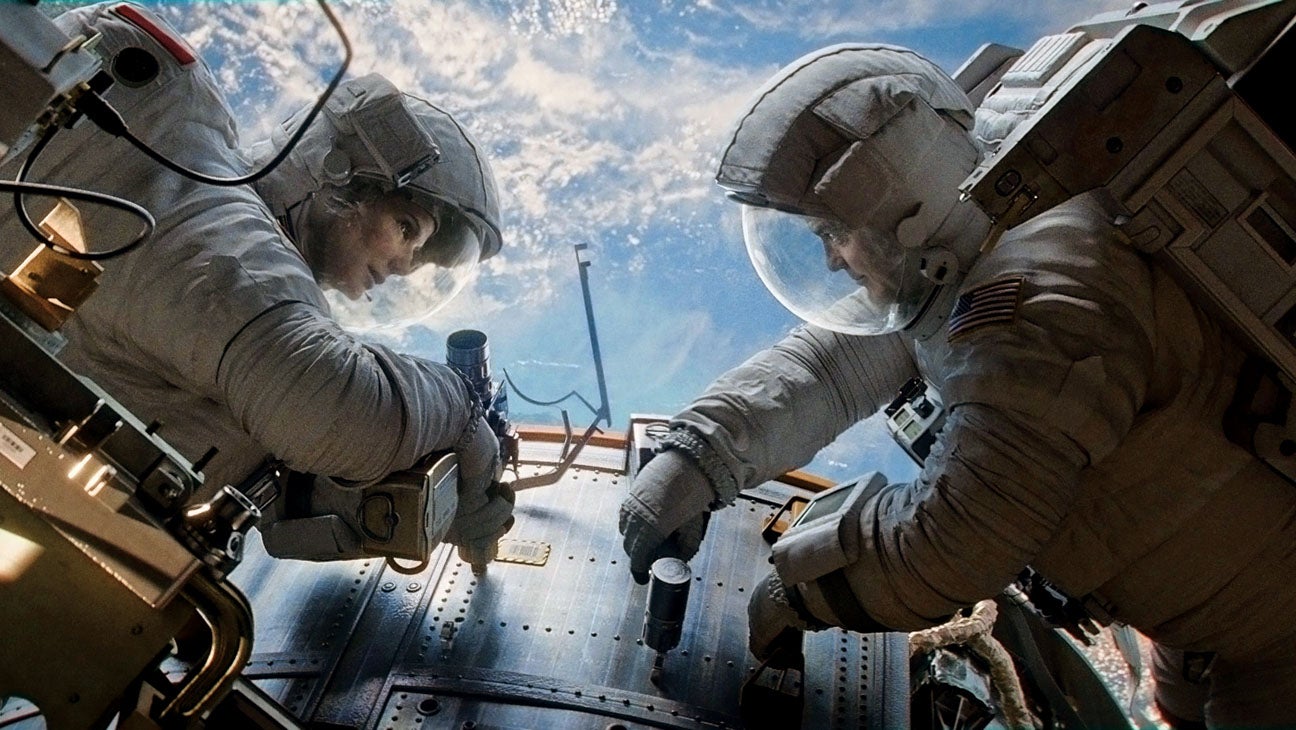
Futuristic sci-fi films wouldn’t be much fun if they imagined the best possible scenario for the future. “Elysium” might be one of the bleakest versions of Earth’s future shown on screen.
It’s approaching the end of the 21st century, and Earth has become extremely overpopulated. Mankind is plagued by disease and pollution. Los Angeles, where the film is primarily set, looks like a third world country. The sleek, electronic buildings that lit up futuristic Los Angeles of “Blade Runner” are nowhere to be found. The tallest buildings we see are nothing but carved out skyscrapers now filled with shantytown homes.
Not everyone is doomed, though. A select few get to go live in Elysium, which is a utopian space station suspended above Earth that looks like a giant recreation of Beverly Hills. Everyone on Earth watches Elysium in wonder while nobody in Elysium can bother to ever look down at the place they once called home.

Max (Matt Damon), who for some reason is the protagonist, dreamed about going up to Elysium ever since he was a little boy. Now, he’s a grown up and he’s still stuck on Earth. He’s one of the lucky few to have a job, which he trudges to everyday while getting pick pocketed by a swarm of people speaking assorted languages (mainly Spanish).
“Elysium” is no easy place to get to. The hardline Secretary of Defense (Jodie Foster) won’t let any illegal civilian step aboard the space station. She is so insistent on this that in a particularly disturbing scene, she releases a series of bombs on a group of ships filled with innocent people.
The space station is almost too good to be true. Not only does it look like the Hanging Gardens of Babylon, but it even has machines that can heal anything from broken bones to cancer. Max gets lucky and ends up in the middle of a freak nuclear accident that gives him only a few days to live, unless he goes to Elysium. Now, he has a real excuse to get up there.
“Elysium” is the second film from South African director Neil Blomkamp. Blomkamp wowed me in 2009 with his debut feature “District 9.” “Elysium” is not perfect, but it’s not fair to call it a sophomore slump. It is filled with great ideas that unfortunately aren’t fully elaborated on. The most disappointing part is to see this nearly fully realized world go to waste. The film is called “Elysium” and Max spends so much time wanting to get there, yet so little is seen of it. Also, the idea of a Los Angeles that looks more like Mumbai is fascinating to me and I would have loved more of it, or even a more expanded view of what the rest of the world looked like at that time. A futurist should be as particular about details as a historian is.

Perhaps some of the universe building troubles stem from the story. “Elysium” is bogged down by a heist plot that boils down to computer hacking on about the same level of silliness as “Independence Day.”* What made a dystopia film like “Children of Men” so great is that exploration of the world was part of the story. “Elysium” limits itself to cold, gray corridors and the insides of rocket ships.** Not to mention that for an action film, “Elysium” has very little action.
Everyone involved in “Elysium” is doing the best they can, especially the actors, who deal with some weak material. Max feels like a generic action hero when Damon is capable of so much more. Not to mention, his love of Frey (Alice Braga), which should be the heart of the film, ends up being quite hollow. Yet, Jodie Foster manages to do a lot with a little and ejects her villain with icy apathy towards the struggles of others by using so few words. The real show stealing performance though comes from Sharlto Copley as the wild card Kruger. This is a complete turnaround from his aloof hero in “District 9.” He crafts a villain who is sometimes funny but can also be frightening just by the way he looks at you. If anyone from this proved to be leading man material, its Copley.
Looking back, “Elysium” at least gives you enough to paint a decent idea of what humanity is like at the time. You just have to look very closely at the small snippets. The best example comes after Max is arrested by two robot cops and then goes to police headquarters, only to go and talk to a voice box. This felt farcical yet totally plausible. “Elysium” shows a future where people are fractured because of lack of communication, whether that’s because technology has replaced most jobs or rich white people have decided to create their own planet. Had “Elysium” explored this more it would have transcended originality and been flat out revelatory. Instead, like many other blockbusters that try really hard to be important, “Elysium” just ends up with a jumbled message.
*I call it silly just because “Independence Day” came out at a very different time for computer technology. Let me just clarify how much I love “Independence Day.”
**No offense to rocket ships.
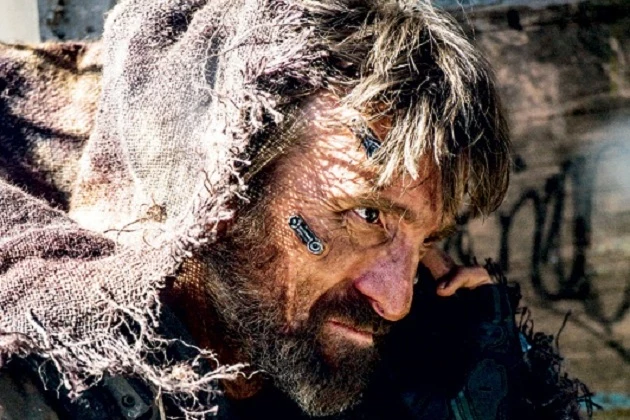
With all of the angry insistance of “you HAVE to see this!” that goes around in popular culture nowadays, it is always nice to see something that is more inviting than exclusive. So far, J.J. Abrams’ “Star Trek” has been great for old fans* while it also creates new ones.
Laying out the entire plot of “Star Trek Into Darkness” here would be of no use, as there are too many details that I am afraid I will give away. The opening scenes involve a chase by some indigenous people through a colorful forest that leads into the center of an active volcano. Now, movies don’t tend to kill of their main characters before the opening credits, especially if that character is Spock (Zachary Quinto), but I was surprised to find out that that was not a simulation as I thought it would be.
Something that worked for me about “Into Darkness” is that it doesn’t get bogged down in cinematic tropes. While there are love interests here, there is no real central love story. The lack of romance allows the film to focus on the most important element in all of “Star Trek”: the strange friendship between Spock and Kirk (Chris Pine).
However, this story is of course not without external conflict. In “Into Darkness,” the Enterprise battles against the genetically superior Khan, who is played by brilliant casting choice Benedict Cumberbatch.** Cumberbatch plays Khan with a level of terrifying restraint. Cumberbatch embraces the idea that the best villains don’t speak much because when they actually do, everyone listens. However, a little more screen time for him wouldn’t have hurt anyone.
While I do not know much about the original Khan, I can say that this Khan is a somewhat complex villain. At least that’s what would happen if you were a genetic creation by man and never really governed by much free will. Khan isn’t quite Kirk’s doppelganger, but both of them do have a crew to watch over, and only one of them really considers that crew a “family.” Surprisingly, it’s not who you think it is.
“Into Darkness” does a much better job expanding the friendly rivalry between Kirk and Spock. “Into Darkness” is a very deep look at the constant yin and yang that forms between emotion and logic. Boiled down, this is what “Star Trek” is all about, and “Into Darkness” very wisely made it a focal point.
Overall, it is hard to find a lot to say about “Into Darkness.” It was a pretty great way to kick off blockbuster season. However, I don’t have any strong opinions about it. “Into Darkness” held my attention for two hours and I followed it on every twist and turn it took. But I guess the best way to end this review is by praising the director himself. “Star Trek Into Darkness” is a blend of many broad sci-fi ideas from space travel to the idea of restoring life to something that is dead. “Into Darkness” tackles all of them with a wonder and excitement. It is never scared of breaking, dare I say it Mr. Spock, logic.***
*NOTE: I have never watched the old “Star Trek” and therefore cannot be held accountable for knowing any major changes made in the films.
**I somehow spelled that right the first time.
***Thank you! Thank you, good night!
According to “Oblivion,” as well as most other dystopian sci-fi films, the future is filled with white rooms and white furniture. This feels less like an ode to Minimalism and more like a director and crew that were too bored to hash out all the details. That’s what “Oblivion” is: the possibility of an original sci-fi property wrapped up in a generic shell.
Director Rian Johnson is exactly what movies need. Perhaps the best way to break Hollywood out of cliche land is to play into the most typical of genre conventions and then turn them completely on their heads.
“Looper” must be the work of someone who doesn’t finish until every little detail is drawn out, and every possible subplot comes full circle. There’s a lot to get through and a lot to sort out, but the fact that the ending pulls it off in an unpredictable way makes it work all the better.
“Looper” might be the first rurban (rural and urban) futuristic dystopia I’ve seen on film. It is not set in New York, Los Angeles, or Washington, but rather an unnamed metropolis and its outskirts in Kansas. It also occupies many different times in the future. Joe (Joseph Gordon-Levitt) is a Looper. In the future, time travel is discovered and very illegal. The mob sends people from the future into the past and it is the job of the Looper to kill them and dispose of the body. Basically, the Looper stands in the field and waits for the body to be zapped to them.

However, there’s a twist to being a Looper: your job doesn’t last long. Because of how illegal time travel is in the future, a Looper must kill their own future self at some point. After doing this, they get a big payday and get to live happily off of it for 30 years until they are kidnapped and brought back into the past. This process is called “closing the loop.” I’m always a sucker for creative wordplay.
I like films which hinge their character’s personalities on their careers, and only a certain kind of person is fit to be a Looper. A Looper must act on the fly, never hesitate, and be prepared to die. You can see this in how Joe shoots every person that is zapped to him without even thinking. However, when his future self (Bruce Willis) is zapped to him, he hesitates. It doesn’t feel like one of those inexplicable movie moments when you wonder “why would he hesitate now?”. On the contrary, it feels very human, as if no one can know what death is like until they actually face it.
Yet, despite an expiration date, Loopers never lose their free will. One Looper (Paul Dano) lets his older self go. Meanwhile, young Joe has no control over the reckless and unruly older Joe; his future self escapes into Young Joe’s present.

While hunting down future Joe and attempting to close his own loop, many other loops are opened, and historical events are altered. “Looper” establishes from the very beginning that time travel is possible and because of that, it never tries to explain it. A story that tries to explain time travel can have difficulty working. Time travel involves many disciplines (philosophy, physics, etc.) that I have only limited knowledge of. Watching a film explain it is like being in a complicated lecture with a professor who won’t explain his notes. “Looper” is not about how time travel came about, but rather what potential consequences it can have.
Keep that in mind when you see “Looper.” Some of the time-altering sequences threw me off guard at first, but just keep in mind that the most accomplished part of the film is that it assumes that the audience is smart enough to at least try and figure it out on its own.
Now that you know that there’s more to “Looper” than untangling mysteries, you can appreciate the immense detail put into this world. I believe this is in part what will make it so memorable. Even the guns that the Loopers use (blunderbusses) are instrumental to the story. In this future, China is the new world leader. This splicing in of timeliness made some people in the audience chuckle, but it made me think of “Blade Runner” creating a future that was heavily influenced by Japan, which was world leader at the time. Like “Blade Runner,” “Looper” can be seen as a reflection not just of how we feel the future will be, but how we feel the present is.
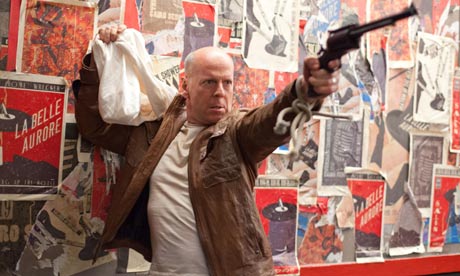
Of course, much has been said about Joseph Gordon-Levitt’s physical transformation into a younger Bruce Willis. This is a great feat for the makeup department. However, Gordon-Levitt pulls it off by actually morphing himself into Willis. Apparently, he only watched recent movies that Willis starred in to prepare for the role. That way, he could understand what Willis would become, as opposed to only who he used to be.
It is kind of an amazing to see two actors play the exact same person sitting in a room together. Watching old and young Joe trying to piece memories together past and present over steak and eggs in a diner is hands-down one of my favorite scenes of any film this year. It is so well directed and written that it ends up being intriguing and even funny all at once.
Then, Johnson makes an unusual choice for a film like this. Instead of speeding it up and constantly raising the stakes and the action, he slows it down. Joe still needs to clear his name. He seeks the notorious gangster and boss of all Loopers, who is named The Rainmaker, as a young boy, and attempts to kill him. Joe leaves the city and heads out to the country, where he finds the young boy living on a farm with his very protective mother (a nearly unrecognizable Emily Blunt). This section of the film might not be the most breathlessly exciting, but it is where it gains its emotional weight. At its heart, “Looper” is the story of what kind of person it takes to make the world a better place.

Rian Johnson seems like one of those filmmakers who is so well versed in cinema. At times, the characters of “Looper” communicate as if they are in a film noir, a convention Johnson also used in “Brick.” Then, it even becomes supernatural (in a way that I will not spoil). The violence in it is not glorified, but it is certainly stylized. Part of the sick, twisted fun of being a filmmaker is discovering all of the different angles you can use to show someone getting shot in the chest.
The most gloriously cinematic part of “Looper” is that pretty much everything that is brought into play at one part of the story is brought back again later on. “Looper” is a meta story because just as Joe must close his own loop, the film must payoff all of its plants and in effect, close its own loops. “Looper” takes place in the year 2044 and shows a world of hovering cars, nearly microscopic cell phones, and drugs in the form of eye drops. “Looper” is not suggesting that time travel will necessarily be discovered by the year 2044, but what it does suggest is that greed and selfishness can lead to an endless cycle of misery. And eyedrops aren’t enough to cure it.
Time Travel Confusion Scale: More than “Back to the Future,” but less than “Lost”
Also, forgot to mention this in my review: Jeff Daniels gives a fantastic performance as the surprisingly zen crime boss. He is currently having the career comeback that I never knew he deserved.
 |
| Look familiar at all? |


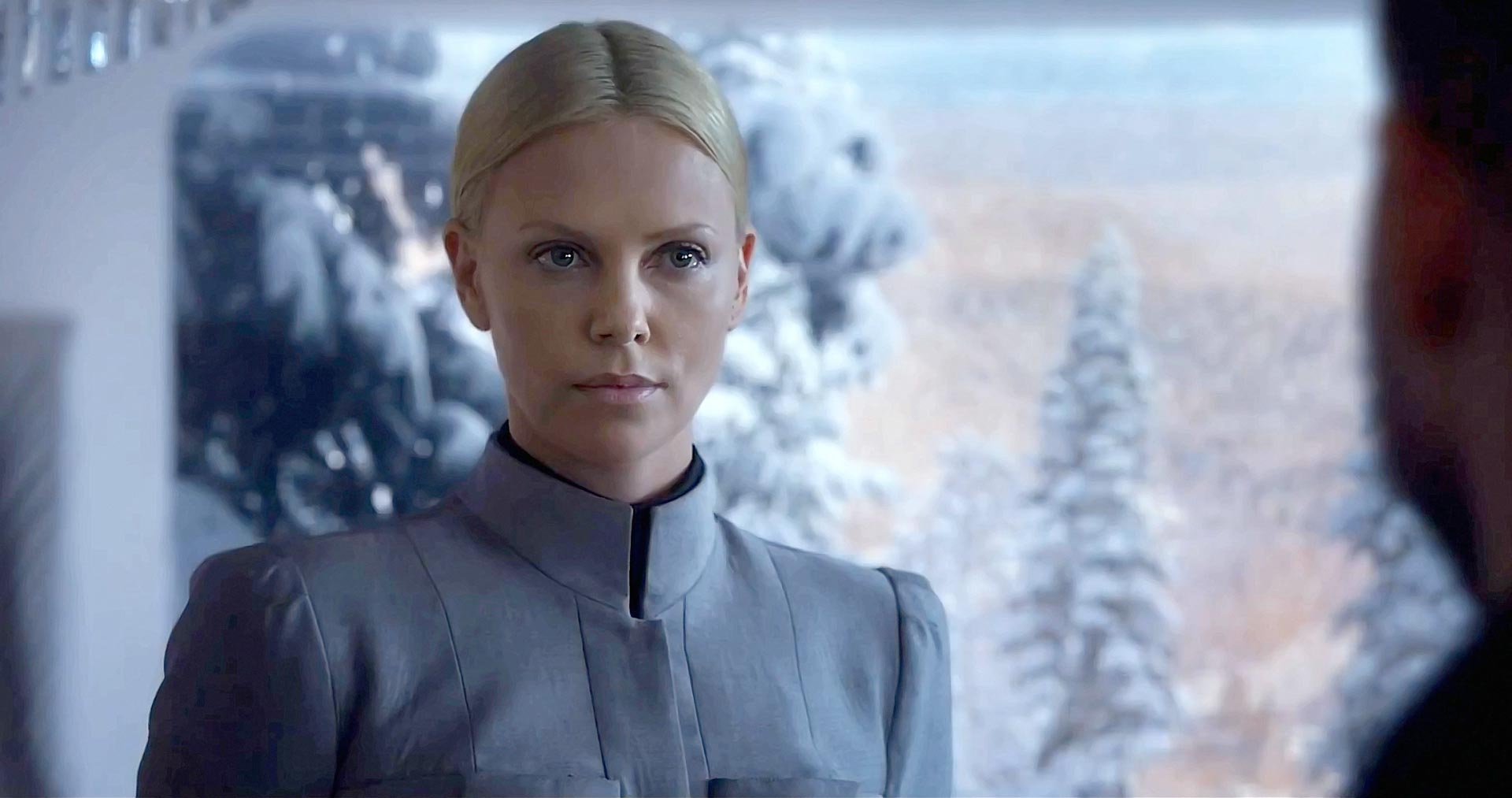

 A lot of unusual things happen to the unassuming western folk of “Cowboys & Aliens.” Mainly, aliens land on earth. Yet, nobody seems to react to it. In fact, these people don’t react to anything at all. Is this a movie, or an assembly of cardboard cutouts?
A lot of unusual things happen to the unassuming western folk of “Cowboys & Aliens.” Mainly, aliens land on earth. Yet, nobody seems to react to it. In fact, these people don’t react to anything at all. Is this a movie, or an assembly of cardboard cutouts?

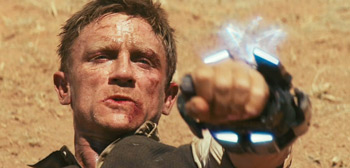

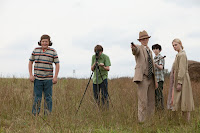 Steven Spielberg has always said that as a child, he would make his model train crash and film it. Decades later, somebody decided to crash a train on film, and they did it just the way Spielberg would have done it.
Steven Spielberg has always said that as a child, he would make his model train crash and film it. Decades later, somebody decided to crash a train on film, and they did it just the way Spielberg would have done it.
